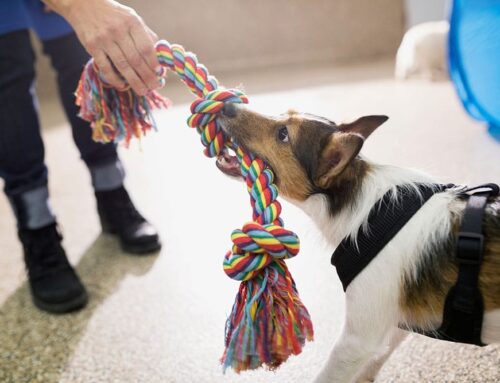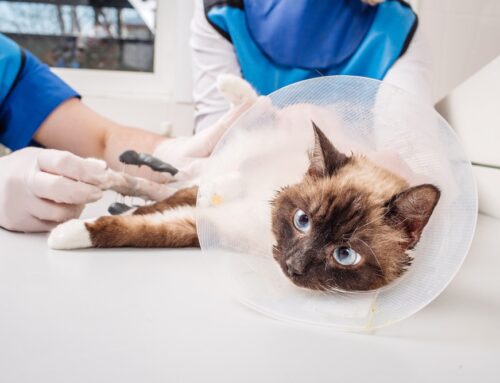Signs of Stress and Anxiety in Dogs and Cats: How to Help
Seeing your beloved dog or cat struggle with stress and anxiety can be heart-wrenching. Many pet owners find themselves asking, “Why is my pet acting this way?” or “Is there anything I can do to help?”
Understanding the signs of stress and anxiety in your pets is the first step toward providing them with the relief they need. At Spring Branch Veterinary Hospital, we are committed to helping you navigate these challenges with compassion and expertise.
Understanding Stress and Anxiety in Pets
Stress is a natural response to a perceived threat or challenge—it’s how animals, including humans, survive. Anxiety, however, is a more prolonged state of fear or worry, often occurring even when no threat is present. While stress can be beneficial by preparing the body for action, persistent anxiety can affect your pet’s health and happiness.
What Causes Stress and Anxiety in Pets?
Pets can become stressed or anxious due to a variety of factors, including:
- Environmental Changes: Moving to a new home or experiencing loud noises like thunderstorms can trigger anxiety.
- Social Factors: The introduction of new people or pets, or a change in the pet’s daily routine, can lead to uncertainty.
- Past Experiences: Previous trauma or lack of socialization can make some pets more prone to anxiety. Recognizing these triggers can help you mitigate their effects and is a crucial step in caring for your pet’s well-being.
Why Stress and Anxiety Matter
Chronic stress and anxiety can lead to behavioral problems and significantly decrease a pet’s quality of life. They may experience physical symptoms such as weight loss, sleep disturbances, or increased susceptibility to illness. Beyond physical health, untreated anxiety can strain the bond between you and your pet, resulting in feelings of frustration and helplessness.
Recognizing the Signs of Stress and Anxiety
Pets exhibit stress and anxiety in various ways. Here are some common symptoms to watch for:
General Signs in Dogs and Cats
- Changes in Appetite: Eating more or less than usual.
- Altered Sleep Patterns: Increased sleep or insomnia.
- Restlessness or Agitation: Difficulty settling down or pacing.
- Excessive Vocalization: Barking, meowing, or whining more than usual.
- Physical Symptoms: Shaking, panting, or rapid breathing.
- Body Posture Changes: Cowering, tail tucked, or avoiding eye contact.
Canine-Specific Signs
- Destructive Behavior: Chewing or digging.
- House Soiling: Unexpected urination or defecation indoors.
- Aggression: Toward humans or other animals.
Feline-Specific Signs
- Hiding or Withdrawal: Seeking solitude or avoiding interaction.
- Inappropriate Elimination: Urinating or defecating outside the litter box.
- Excessive Grooming: Leading to bald patches or skin irritation. It’s important to recognize these signs. If you notice any unusual behaviors, What’s Wrong? Common Pet Pain Signs can provide further insight into whether pain may be a contributing factor.
The Progression of Stress and Anxiety
Without intervention, stress and anxiety can worsen. Symptoms may become more frequent and severe, leading to chronic health issues such as immune suppression and gastrointestinal problems. Behavioral issues like aggression can escalate, increasing the risk of injury to the pet or others.
Diagnosing Stress and Anxiety
At Spring Branch Veterinary Hospital, our approach includes a thorough examination to rule out medical conditions that may mimic anxiety. Behavioral assessments help identify triggers and patterns. Diagnostic tests such as bloodwork or imaging may be necessary to uncover any underlying health issues. Resources for Preventive Testing for Senior Pets can be particularly valuable for older animals.
Treatment Options for Stress and Anxiety
Treating anxiety requires a comprehensive approach that may involve:
Behavior Modification Techniques
These include counter-conditioning and positive reinforcement to change the pet’s response to stressors.
Environmental Enrichment
Providing toys, puzzles, and regular exercise can help alleviate anxiety and provide healthy outlets for energy.
Medications and Supplements
In some cases, medications like SSRIs or supplements such as L-theanine may be prescribed to help manage anxiety. Learn more about Supplements for Senior Dogs that can assist with stress management.
Integrative Therapies
Methods like acupuncture and massage therapy may offer additional support.
Addressing Age-Related Issues
Managing pain and adjusting the environment for senior pets, as outlined in Supporting Your Senior Pet: Veterinary Care Recommendations can help reduce anxiety associated with aging.
The Impact on Daily Life
Stress and anxiety can disrupt not just your pet’s life but also your household. Pets may alter their routines, experience emotional distress, or damage property. Family members might also feel stressed, impacting the overall atmosphere at home.
Preventive Tips and At-Home Support
- Create a Safe Space: Establish a quiet area with calming pheromone diffusers or soothing music.
- Consistency is Key: Maintain regular feeding and exercise schedules.
- Assistive Devices: For senior pets or post-surgical needs, Assistive Devices for Dogs with Arthritis can improve mobility. Better mobility is critical for mental health and exercise needs.
Preparing for Your Visit
When planning a visit to our clinic, consider bringing:
- A detailed list of symptoms with notes on their frequency.
- Videos or images capturing concerning behaviors.
- A record of current medications and supplements.
Questions to Discuss with Your Veterinarian:
- What triggers might be stressing my pet?
- Which treatment options are most suitable, and what should I expect regarding side effects?
- How can I better support my pet at home?

FAQs
Q: Is my pet just being “difficult,” or is there genuine anxiety? A: Behavioral changes like excessive grooming or hiding can indicate anxiety rather than behavioral stubbornness.
Q: Can I use natural remedies? A: Yes, alongside prescribed treatments, supplements may help ease anxiety. Always consult with a vet before starting any new regimen.
Q: How quickly will I see improvements? A: It varies based on the pet and treatment. Patience and consistency are crucial.
We’re Here to Help
At Spring Branch Veterinary Hospital, we understand the emotional toll of seeing a pet in distress. Our dedicated team is here to help you provide the best care possible for your beloved animal. If you have any questions or need advice tailored to your pet’s unique situation, don’t hesitate to contact us. Schedule an appointment today to ensure your pet receives the compassionate care they deserve.









Leave A Comment